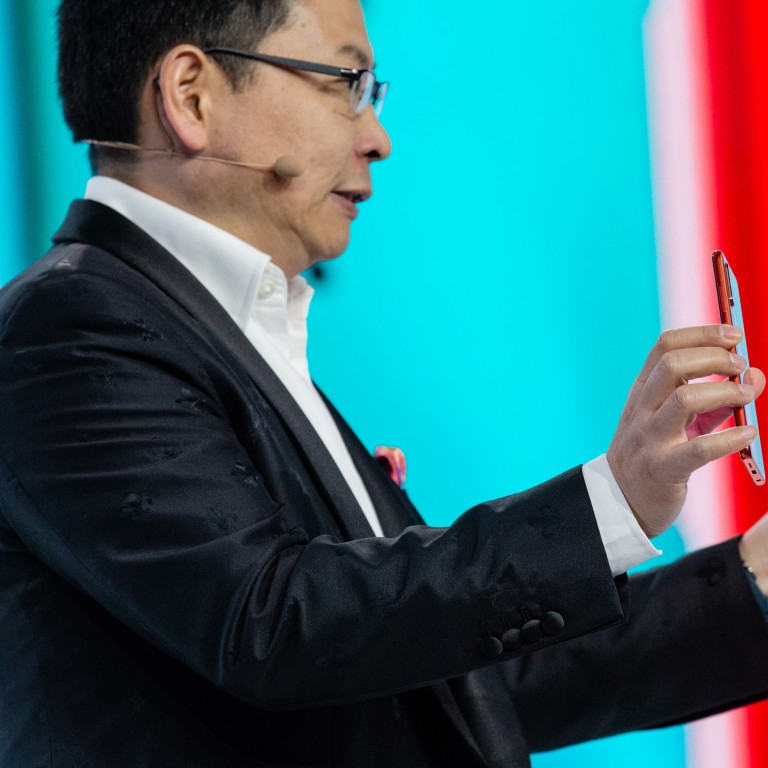
Huawei’s mobile chief expects self-developed OS to be ready for market roll-out as early as year end
- Huawei uses Google’s Android system for its smartphones and Microsoft’s Windows on its laptops and tablets
Huawei Technologies, the Chinese smartphone giant facing a US ban that may prevent it from installing Google services on handsets sold in overseas markets, plans to launch its own operating system compatible with Google’s Android, according to Huawei’s mobile business chief executive Richard Yu Chengdong.
Huawei’s self-developed OS will be able to support a range of products and systems within its ecosystem, including smartphones, computers, tablets, TVs, automobiles and smart wear, which will also be compatible with all Android applications and existing web applications, Yu was quoted as saying in a Securities Times report published on Tuesday.
“The Huawei OS is likely to hit the market as soon as this fall, and no later than spring next year,” said Yu.
Huawei did not immediately verify or comment on the report.
Shenzhen-based Huawei, which uses Google’s Android system for its smartphones and Microsoft’s Windows on its laptops and tablets, has long sought to have its own OS to reduce its dependence on US vendors and to prepare for the worst case scenario.
The US government last week placed Huawei and its affiliates on a trade black list that restricts the company from buying services and parts from US companies without approval. US President Donald Trump also signed an executive order barring US companies from using telecommunications equipment made by firms posing a national security risk. The move was widely perceived by China as an attempt to contain the rise of its technological capabilities.
Google suspended access to some services for new Huawei Android devices but a 90-day reprieve from the US government on Monday will allow the Chinese company to maintain existing networks and provide software updates to its existing devices. Separately, Huawei confirmed this week it has been stockpiling critical components in the event of such a ban.
But deploying and maintaining its own OS for its devices will be a “daunting task”, said Tarun Pathak, associate director at Counterpoint Research, especially as the company looks to compete in the premium segment.
“The premium segment is growing fast, and seamless integration of hardware and software is now a must to drive consumer experience,” said Pathak. “In the absence of an Android licence, Huawei will have its work cut out to build something that can live up to the Android experience.”
James Yan, research director for Counterpoint, said Huawei was doing a good job in developing its own ecosystem like Apple has, which would benefit from the deployment of its own OS that connects all its services and products. But he added that it was still too early to say whether Huawei’s OS could match up to Apple’s, especially when serving overseas users.
Tim Watkins, head of Huawei in western Europe, said the company was “astounded” by the ban but was also “as well prepared as we could have been”, according to a Financial Times report on Monday.
Huawei seems unaffected by the restrictions for now as its budget phone brand Honor launched its latest flagship Honor 20 in London on Tuesday, including three new handsets – the Honor 20 Lite, Honor 20 and Honor 20 Pro – which cover the mid to low price range and supplement the Huawei brand’s premium position in the market.
Honor president Zhao Ming did not mention the Google ban during the product launch. Honor confirmed that its new phones are equipped with Google’s Android services such as Google Play, Google Maps and Gmail.
“Google is a good company, a highly responsible company which is also convincing the US government to solve this problem,” Huawei founder and CEO Ren Zhengfei told Chinese media on Tuesday.
Huawei is discussing an alternative plan with Google and the company’s experts are currently working on the issues, Ren said, according to a transcript verified by Huawei.

